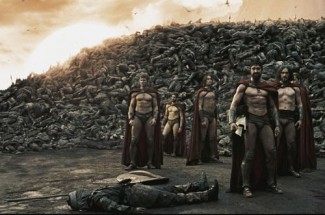Today we have a little history lesson. Most men out there have come across the movie 300. The movie was generally accepted as a pretty good action flick. It is all based around the Battle of Thermopylae, at which 300 Spartans took on a HUGE number of Persian soldiers. This makes it’s way onto the blog for men for obvious reasons. 300 vs. 200,000….it takes some serious guts to willingly step into odds like that. Read below for a little more info on the ancient Greeks…
This battle was between a few Greek city-states (primarily Sparta) led by King Leonidas and the Persian Empire led by Xerxes.
The full Spartan force was made up of approximately 300 Spartans, 700 Thespians, and 400 Thebans. The Persian army was a force that vastly outnumbered the Greeks. Scholars have debated the actual number of Persians at Thermopylae for years, but modern consensus has the Persian forces numbering around 200,000. This battle however would be decided not solely by numbers, but by three other factors: the Spartan warrior cultures, sound military planning, and ultimately…betrayal.
Sparta lived in a military culture; all Greek men were a member of the active military until the age of sixty. Spartan boys began their military training at age 7 in what Spartans called the “Agoge”. In the Agoge boys were taught physical toughness, they had to steal in order to have enough food to eat, and they were taught fighting and weaponry. Some were even sent into the wilderness with nothing but a knife. At 18 they became full fledged members of the army where they would bond closely with the rest of the army and stay on full active duty until the age of 30 (remaining on reserve until the age of 60 as mentioned earlier). This military culture, a culture where men fully bought in to this militaristic culture, made the men fully believe that this moment was the apex of their lives.
The decision by King Leonidas to position the Greek forces at the “Hot Gates” was true military genius. This passage was a narrow corridor with the mountains on one side and a cliff on the other. Using this position it made it possible for the Spartans to line the narrow passage, and only as many Persians could attack as could fit in the narrow pass, effectively forcing the numbers to be even. This geographical advantage almost won the battle for the Spartans
Ultimately, A Spartan traitor named Ephialtes informed Xerxes of a secret path that would allow the Persians to sneak behind the Spartans, which was a sure step to the defeat of the Spartans. Ephialtes did this for monetary reward, so as demonstrated so many times…the treachery of man alters history.
In the end, most of those in the small Spartan group lost their lives, but their sacrifice enabled the rest of Sparta to assemble and ultimately push the Persians out over the next year.


Comments on this entry are closed.
Though Leonidas succumbed in the battle but he provided ideal time for the Greek city to be vacated. It is heard that Xerxes found an empty city when he entered into Athens. He was very furious. So Leonidas sacrificed his life for the cause of Greek citizens. It is a lesson for every administrator.